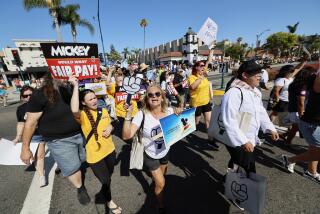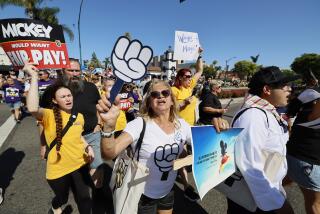BART strike: S.F. commuters brace for a Monday ‘nightmare’ if no deal
The BART strike that hit the San Francisco Bay Area on Friday was met with mixed reactions by a wary public, but many commuters feared a true life nightmare if the labor dispute keeping roughly 400,000 workday riders from the rail system spilled over into Monday.
The effects of no commuter rail service Friday appeared to hit travelers hardest in the early morning, with long lines at toll booths and ferries headed to San Francisco. But by the time the 8 a.m. hour rolled around, much lighter crowds were reported at ferry docks and bus lines. Carpool pick-up stations sat mostly devoid of passengers looking for a ride.
For those who couldn’t work from home Friday, transit officials had asked residents to commute at off-peak hours. And some commuters said it looked like that’s what happened.
PHOTOS: Commuters grapple with BART strike
“It’s weird, it’s the first day, a lot of people must have taken Friday off,” said Scott Tracy, a 43-year-old community service worker who commuted from Livermore.
Taking Friday off is one thing, but staying home or telecommuting again on Monday may be a taller order.
“It’s going to be a nightmare,” Tracy said.
BART riders were left without rail service Friday after negotiations between Bay Area Rapid Transit management and the leaders of Service Employees International Union Local 1021 and Amalgamated Transit Union Local 1555 crumbled late Thursday.
The strike is the second BART work stoppage in four months, and comes after Gov. Jerry Brown stepped in with a 60-day cooling-off period as the latest labor dispute heated up.
Both sides reported making concessions on numerous issues -- including health benefit and pension contributions -- but talks broke down over issues such as overtime scheduling and how to manage worker pay stubs, local media reported.
And on Friday, all parties engaged in a round of finger-pointing after a marathon session of talks ultimately failed. With the federal mediator having pulled out of the stalled talks, it was unclear where or when progress on key sticking points would be made.
Every day the strike continues is not only a drag on commuter schedules, but on the economy. The Bay Area Council, a regional business organization, calculated the costs of BART’s 4½-day strike in July at $73 million a day.
Part of that cost is tied to lost productivity.
Paula Riascos, a 29-year-old student who also babysits, said she has no car and relies on the BART system to get to around the city. Her boyfriend drove her across the bay Friday, but she was unsure about what to do in the days ahead if the strike wore on.
“I don’t know what I am going to do in the morning,” she said.
ALSO:
Man sought in Huntington Beach robbery, sexual assault
BART strike: About 400,000 S.F.-area commuters to be affected
Bags stolen at Raging Waters contained L.A. County sheriff’s badges
Twitter: @mauradolan
More to Read
Sign up for Essential California
The most important California stories and recommendations in your inbox every morning.
You may occasionally receive promotional content from the Los Angeles Times.











